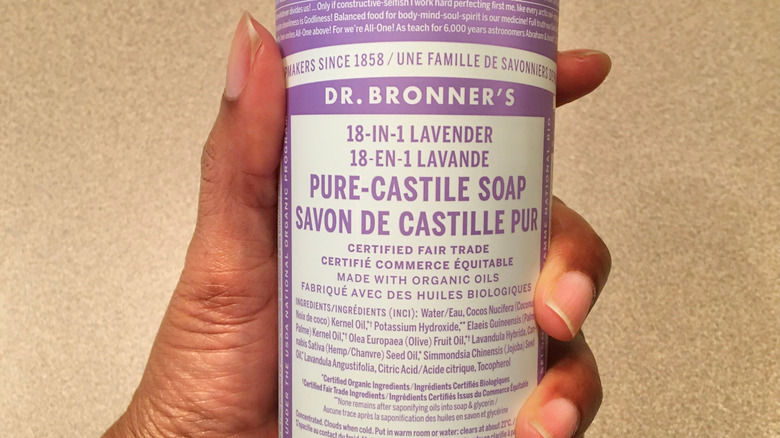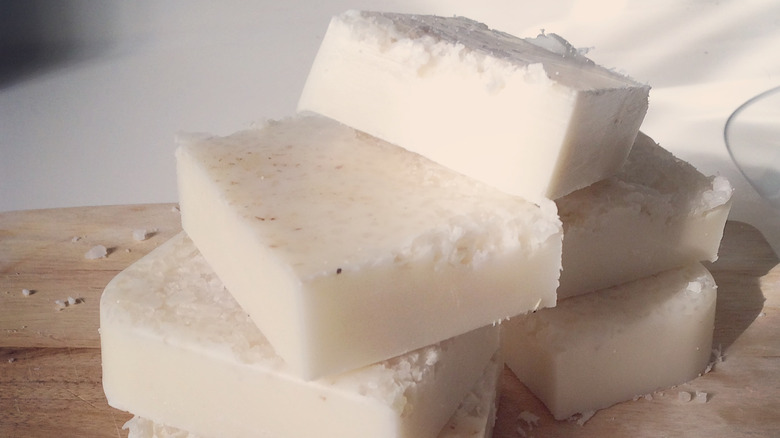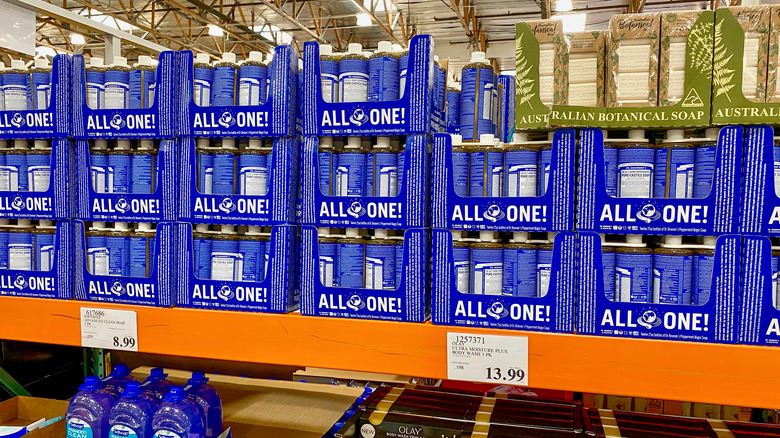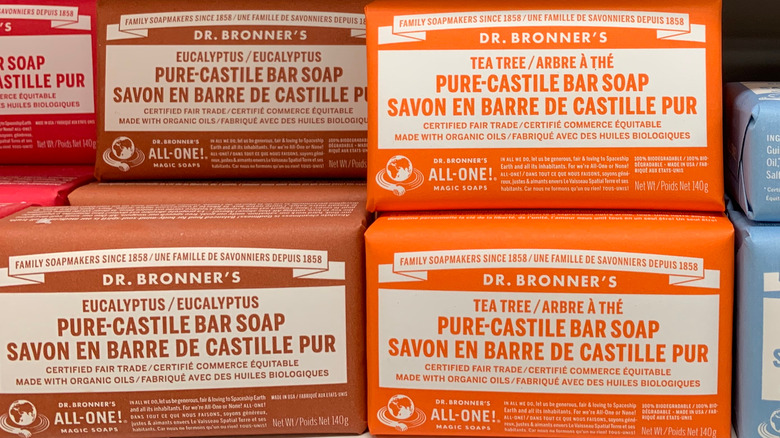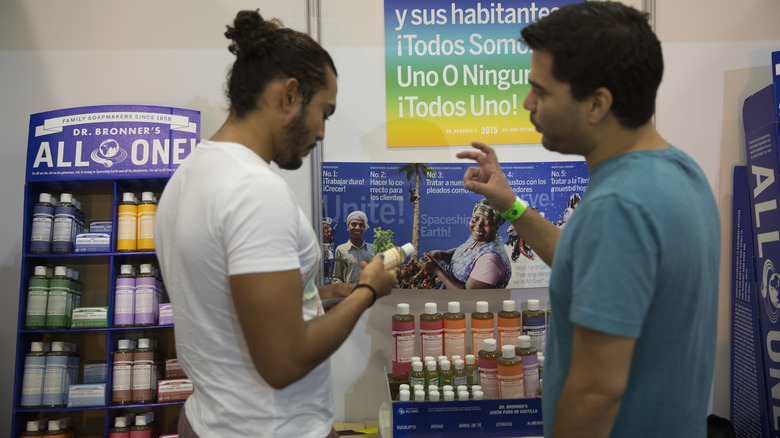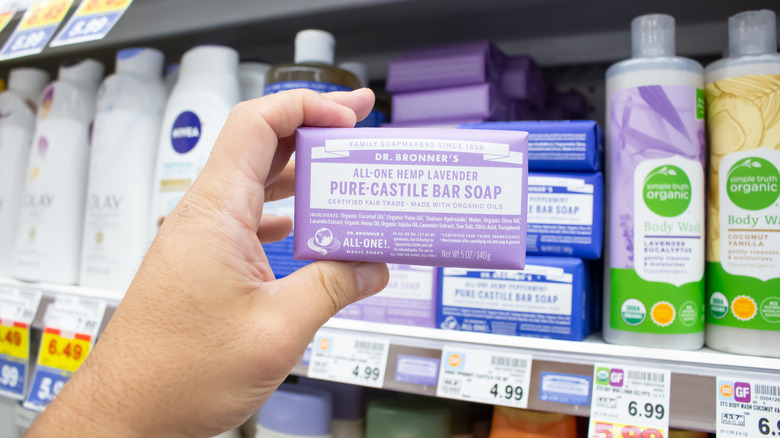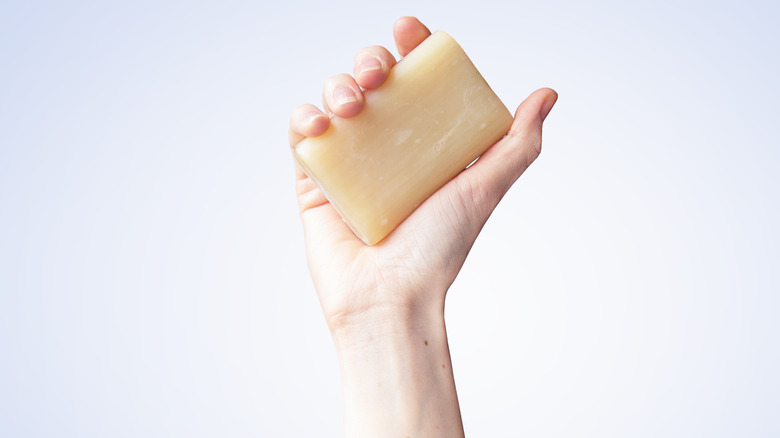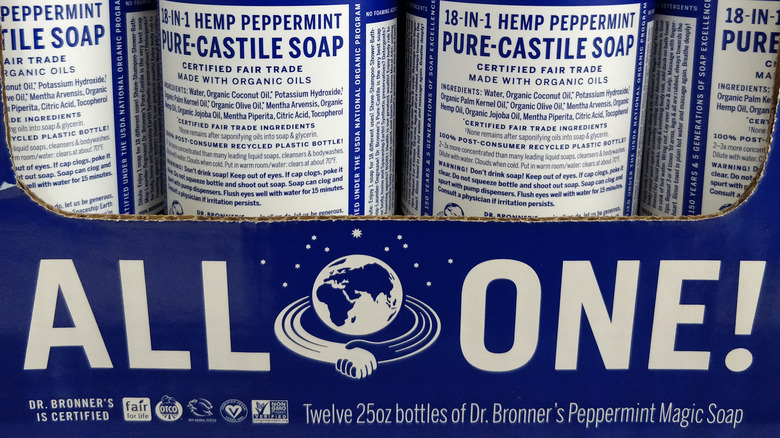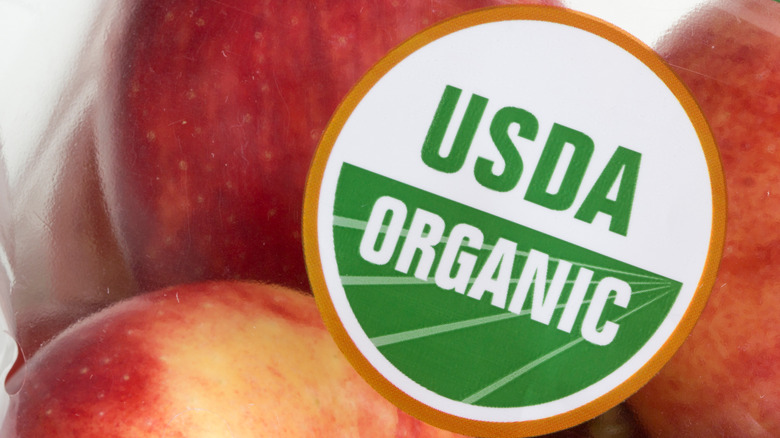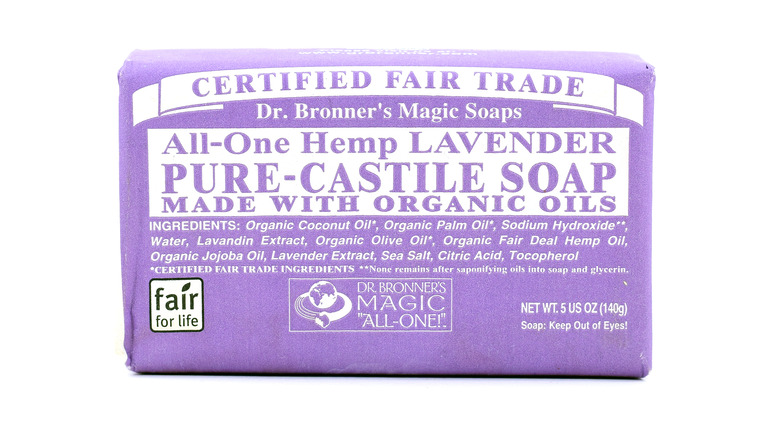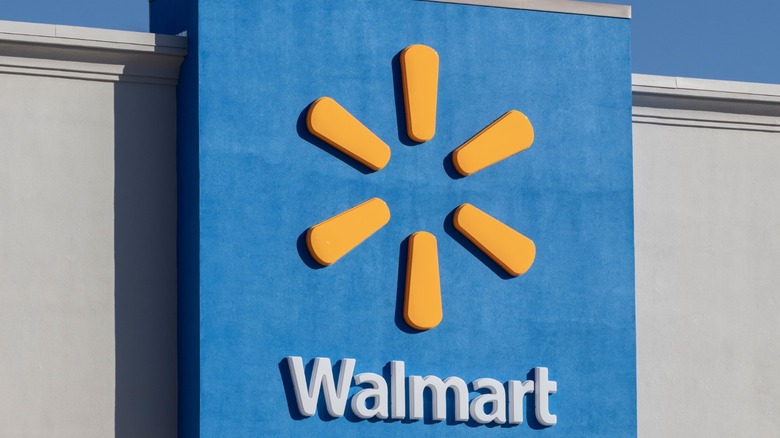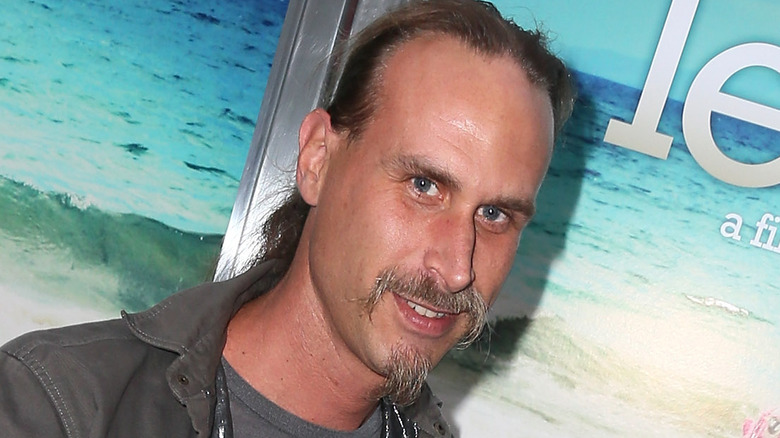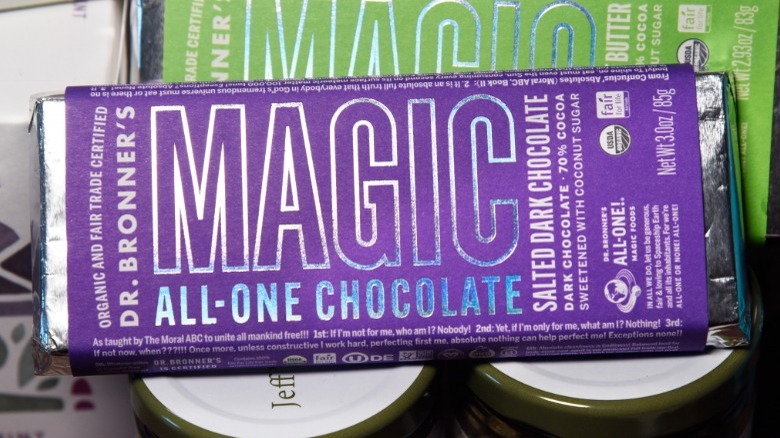Dr. Bronner's: 14 Facts About The Magic Soap Company
Even if you've never used Dr. Bronner's All-One pure castile soap, you probably recognize the label of this cult favorite. Covered in quirky, numbered manifestoes that preach everything from cleanliness to global unity and boasting over a dozen modern-day uses, it turns out that the soap itself has an intriguing backstory that all leads back to its founder, Emanuel Bronner. While the company is now owned and operated by his grandsons, David and Michael Bronner, the original Dr. Bronner is as intriguing and enigmatic as the text on his namesake soap labels.
Founded in 1948, Bronner was a third-generation master soapmaker who led his company to the top of its niche market. Though Mother Jones notes that his birth name was Emanuel Heilbronner, he dropped the "Heil" upon arrival to the U.S. due to the word's dubious connections with Hitler. Bronner was also not a doctor, though according to the Dr. Bronner's website, these small details haven't held the company back in the retail world. Dr. Bronner's now boasts the title of "top-selling soap in the U.S. natural marketplace," with "only the purest organic & fair trade ingredients." As a leader in natural, fair trade, and organic products, Dr. Bronner's continues to be guided by their founder's motto, "We are All-One or None!"
Dr. Bronner's has Jewish-German soapmaking roots
While Dr. Bronner's was founded in 1948, the birth of the brand goes back even further: to the early 1900s, where Emanuel Bronner lived in southern Germany as a third-generation soapmaker. According to an episode of podcast "WTF with Marc Maron," thanks to an intergenerational fight with his father and uncles, Bronner left Germany for the U.S. and escaped before the Nazis seized power. Sadly, his family wasn't spared the same fate, and the original company was lost to the Nazis, who stole the brand and Aryanized it.
After, both of Bronner's parents were murdered in concentration camps, and he sought out a platform to spread his spiritual message. Enter: the labels of his eponymous soap brand. Bronner was heavily inspired by Judaism and believed that, in the wake of the Holocaust and in the shadow of nuclear war, it was his life's mission to spread a positive message and unite the world. The labels of his soaps ultimately allowed him that platform.
It all started on a soapbox. Literally.
Before he turned to his soap labels, Emanuel Bronner first turned to a literal soapbox to preach his beliefs in equality. According to Hatch Mag, Bronner lectured passersby on his Moral ABCs, which still appear on his labels today. These tenets all shared common themes, "that we are all one from the same god, and should work hard and give back to the earth." At the end of each lecture, Bronner closed with his final sentiment, which is also still on his labels: "We are All-one or none!"
Bronner's first lectures took place on the steps of the University of Chicago, and he was motivated by his mission to end the threats of nuclear holocaust — something he feared was impending due to ethnic barriers. Then, in 1948, Bronner started his company in Los Angeles and gave away samples as he lectured in Pershing Square, "a hotbed for activism at the time." When Bronner realized that people were taking the free samples but not staying for the lectures, he began printing his Moral ABCs directly on the label.
Dr. Bronner spent time in a mental hospital
In an interview with Robert Smith for NPR's Weekend Edition Sunday, documentarian Sara Lamm shared what she learned about Emanuel Bronner while directing her film, "Dr. Bronner's Magic Soapbox." Apparently, before creating his soap label, Bronner once escaped from a mental institution. After arriving in the U.S. in 1929 and working to spread what he called "Bronner's peace plan," Bronner learned that his parents had been murdered by the Nazis. "Right around that time, he became extra engaged in what he was preaching," Lamm explained.
This peace plan became the basis for Bronner's Moral ABCs, but as he worked to spread his message, his sister became increasingly concerned about his sanity. As a result, she had him involuntarily committed to a mental hospital. In the late 1940s, however, Bronner escaped the institution and left for California, hitchhiking his way to Los Angeles. It was there in 1948 that he began creating the formula for what would become his famous peppermint soap.
The labels carry on Dr. Bronner's legacy
Like many fans of Dr. Bronner's soap, Beverly Leestma of the Make Your Own Zone was extremely interested in learning the backstory of the actual text we still see on Dr. Bronner's soaps today. As she notes, it's not just the actual text that's intriguing — it's the density and sheer amount of words crammed onto each label that's so eye-catching.
Some of the Moral ABCs are numbered, most likely in relation to Emanuel Bronner's original Moral ABCs. Many are religious in nature, and almost all read as if they were written via the stream-of-consciousness method. The majority include the phrase "all-one" in some form or another, and they feature a heavy amount of exclamation points! But as Leestma points out, "Most of his ramblings, even though they are pretty hard to decipher, seem to be positive in nature, hoping for the moral behavior of mankind, and peace between earth's people." This was Bronner's greatest passion, and his legacy is carried on through his labels and company values to this day.
Dr. Bronner's remains all in the family
Emanuel Bronner died in 1997, but his company remains family-owned and operated; his one grandson, David Bronner, serves as the CEO and his other grandson, Michael Bronner, is the appointed president. On a 2014 episode of the hit podcast "WTF with Marc Maron," David discussed his grandfather's legacy while promoting Gero Leeson's book, "Honor Thy Label: Dr. Bronner's Unconventional Journey to a Clean, Green, and Ethical Supply Chain." Though the book was written by Leeson, who was Vice President of Special Operations at Dr. Bronner's, David wrote the foreword.
As detailed in the book, ethical sourcing continues to be the company's biggest priority, and the tome examined their efforts while also sharing a full history of the company's origins. During his interview with Maron, David shared other modern ways the company carries on his grandfather's legacy — including the fact that the majority of the company's profits are donated to charity, and upper management salaries are capped in relation to their lowest-ranking employee.
You won't believe the size of Dr. Bronner's ad budget
According to Vox, Emanuel Bronner's grandsons, David and Michael Bronner, are vehemently against social media. In fact, David, who is the CEO, even referred to it as "essentially amoral" despite the fact that this has been one of the main ways Dr. Bronner's has achieved its massive success. Along with influencers sharing their favorite hacks for Dr. Bronner's castile soaps, a wide array of celebs also sing the brand's praises. Vox cites big names ranging from makeup guru Bobbi Brown, to A-listers like Olivia Wilde, Sandra Bullock, Jason Mraz, Greta Gerwig, Zoë Kravitz, Drake, Kate Hudson, Natalie Portman, and Lady Gaga, to actual royalty: Meghan Markle, the Duchess of Sussex.
But for all of this star-studded success, Dr. Bronner's hasn't paid a penny — that's right, their advertising budget is zero. They don't pursue celebrity endorsements, or shell out for advertising in the form of television commercials, magazine ads, billboards, or posters. Instead, the brand prefers to spend their revenues on activism.
Dr. Bronner's is all about the ethics
While Emanuel Bronner's grandson, David Bronner, publicly detests social media, it doesn't keep the Dr. Bronner brand entirely off of Instagram. But as you might expect, their feed is dedicated to spreading positive messages and daily affirmations, promoting activism, and sharing special cleaning and life hacks using Dr. Bronner's varying products.
Along with sharing Emanuel's original tenets and Moral ABCs, Dr. Bronner's is also extremely focused on creating all of their products from ingredients that are fair trade and organic. Their profile and feed also demonstrate the brand's commitment to sourcing materials ethically and creating only cruelty-free products. Sure, they'll occasionally highlight the launch of their own products — such as their All-One chocolate. But the Dr. Bronner's team also shares other ways you can live more ethically. One post shows how to create reusable DIY cleaning wipes using Dr. Bronner's soap and Sal Suds, and another post is dedicated to washing clothes while camping.
Dr. Bronner's works great for some uses, but not for others
While Emanuel Bronner created "All-One" as a motto for humanity, it also applies to the brand's 18-in-1 Pure Castile Soap. But as the testing team over at Brokelyn learned, it really depends on your personal experience ... because every use does not work well for every person.
When it comes to the typical uses, like body wash, facial cleanser, and shampoo, you're likely to find that Dr. Bronner's soap works just fine, if not great. House Digest has already confirmed that Dr. Bronner's works well for dish soap, and if you're not using essential oils to clean your bathroom, it can be used to surface clean, too. But while one reviewer gives Dr. Bronner's a 5/5 as a fruit wash, she declares it a 1/5 as a toothpaste. Other successful uses include shaving cream, and while deodorant and laundry soap weren't total fails, the soap still did not rank quite as high as some of the more basic applications.
Also, an important warning from that same reviewer: At one point, Dr. Bronner's claimed it could be used as a contraceptive douche. Do not do this. Other uses that are no longer recommended by the brand (but were when Bronner was alive and well) include pest spray, diaper soap, and pet wash.
David Bronner loves a lawsuit ... but it's not what you think
While the idea of a lawsuit-happy businessman might seem against everything Dr. Bronner's stands for, in this case, David Bronner is acting in the interest of protecting everything his company stand for. According to Inc., Bronner sued the DEA for treating industrial hemp as a narcotic, despite the fact that there are only trace amounts of THC in it –– comparable to the amount of opium in poppy seeds. Later, Bronner sued some of their biggest competitors in 2008 for falsely claiming they were organic.
After seeking certification by the United States Department of Agriculture through their National Organic Program, the team at Dr. Bronner's discovered there are virtually no rules for brands who want to call themselves organic. This meant popular brands like Jason, Estée Lauder, and Kiss My Face were allowed to claim they were on par with Dr. Bronner's in terms of fair labor practices and ethical sourcing. When Whole Foods challenged the brands to meet higher standards, the industry was forced into "organic integrity," as Inc. explains.
A need for ethical ingredients got Dr. Bronner's into the farming business
According to Inc., when David Bronner needed raw materials but no longer wanted to buy from operations that didn't share the same goals when it came to labor that he did, he created a new goal for the company. Beginning in 2005, David wanted to switch Dr. Bronner's over to certified fair trade ingredients, aiming to be fully transitioned in two years. But when David began the search for farms that could fairly and ethically produce the organic materials the company needed, he came up empty.
Unable to source ethical ingredients, David instead decided Dr. Bronner's would get into the farming business. Within three years, the company had established a fair trade coconut oil plant in Sri Lanka with 200 employees, a palm oil operation with 150 workers in Ghana, and had become partners with an Indian peppermint oil manufacturer. Dr. Bronner's also partnered with a program that pairs olives oils from farmers in the West Bank and Israel. Given Emanuel Bronner's call for an All-One approach to humanity, the collaboration between Israeli and Palestinian feels particularly poignant.
The CEO of Dr. Bronner's is doing it his way
After becoming CEO of Dr. Bronner's at age 25, David Bronner knew he wanted to handle the company in an even more radical way than it had been up to that point. Adopting the company from his dad, Jim Bronner, who died of lung cancer in 1998, it wasn't long before David instituted a policy that ensured that the highest-paid executive at Dr. Bronner's could make no more than five times as much as the least compensated employee, according to Mother Jones. Today, David's salary is around $200,000.
Along with being an activist, David is almost as quirky as his grandfather. For one, he's hired friends he made at Burning Man, an annual festival held in the desert. Additionally, Dr. Bronner's has one role called Director of Social Activism and another called Foam Maestro. The latter role is held by one of David's Burning Man friends and requires driving "a psychedelic, soapsuds-spewing fire truck to music festivals." But while David jokes that the company is almost run like a non-profit, his mother and company CFO Trudy Bronner begs to differ. "We're a for-profit business," she proclaimed. "And we make good money and pay our employees really well."
Why did it take so long for Walmart to carry Dr. Bronner's?
Walmart now sells Dr. Bronner's soaps, lotions, and toothpaste, but this was not always the case. According to Mother Jones, the company's politics historically leaned to the left, and CEO David Bronner refused to sell his products at Walmart not once but twice. Apparently, Bronner disagreed with Walmart's employee pay rates and right-leaning politics.
The Walton family is the heir of Walmart, but the various members seem to support both Democrats and Republicans. Alice Walton has contributed to both sides, and Christy Walton contributed to the left-leaning Lincoln Project. However, Forbes reported that Walmart's president and CEO, Doug McMillon was an advisor to President Trump and supported other Republican politicians.
According to Bustle, Walmart began selling Dr. Bronner's products in 2018. Though there's no guarantee of what it'll have in stock at its brick-and-mortar stores on any given day, the website lists the brand's soaps, hand sanitizers, toothpaste, and baby products for sale.
David Bronner is on the Multidisciplinary Association for Psychedelic Studies' board of directors
According to Marijuana Moment, the psychedelics decriminalization movement has gained traction over the past few years, with states like Oklahoma and Connecticut pushing for reform. The Multidisciplinary Association for Psychedelic Studies (MAPS) is a psychedelics research and advocacy group, and it promotes the safe, legal use of marijuana and psychedelics for mental healing. The organization's website claims that this is done through rigorous scientific evaluation.
David Bronner is MAPS' CEO, but instead of Chief Executive Officer, the acronym stands for Cosmic Engagement Officer. Awesome! Although that title might bring a smile to people's faces, this organization is no joke. Behavioral Health Business shows that MAPS has an FDA (U.S. Food and Drug Administration) breakthrough designation and is heavily involved with psychedelics and PTSD research. It has helped promote MDMA-assisted therapy, which will be evaluated by the FDA soon. According to NIH National Institute on Drug Abuse, MDMA is an acronym for methylenedioxymethamphetamine; the more familiar name of this drug is ecstasy. Behavioral Health Busines adds that MDMA and other psychedelics like LSD and psilocybin are increasingly being used to treat PTSD, depression, and other behavioral health conditions.
Dr. Bronner's got into the chocolate industry
VegNews announced that Dr. Bronner's introduced its line of vegan chocolate bars in August of 2021. Called Magic All-One Chocolate, it debuted with six flavors, including salted almond butter and smooth chocolate praline. The idea for selling ethical chocolate bars came from within the company's own sources: It discovered that the organic farmers it used for organic, fair-trade palm oil for its soap also grew cocoa. So why not make the best of a good situation? Vice President of Special Operations Michael Bronner claimed that traditional chocolate production was not good for the environment and promoted worker exploitation and poverty. He stated that the company's chocolate production model was more constructive.
Dr. Bronner's Magic All-One Chocolate Salted Dark Pack is sold on the website and is priced at about $33.00 for six bars (18 ounces total). Each 3-ounce bar contains fair trade ingredients like organic bourbon vanilla bean and organic coconut sugar. You can also find combo packs that have different flavors. Each chocolate bar clocks in at less than $6, which might seem like a lot when you compare it with Hershey's, but quite affordable when you compare it with other luxury and fair-trade chocolate brands, like the $10 Fruiton Chocolate bar. The prices are higher because the farmers are compensated fairly, and the land is carefully taken care of, ensuring it's not over-farmed.

